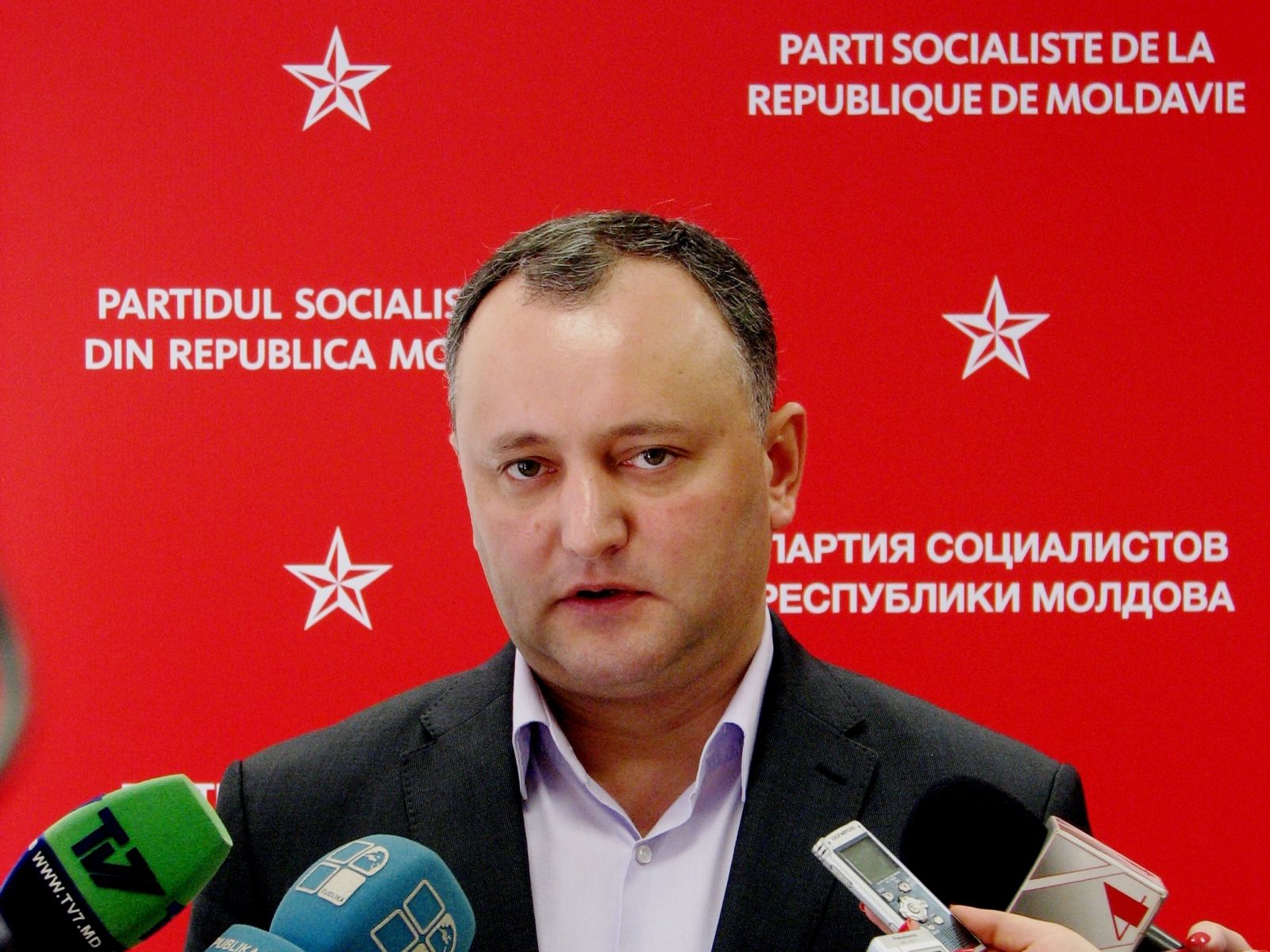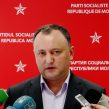
Russia’s New Moldovan Favorite: Igor Dodon’s Socialist Party
Publication: Eurasia Daily Monitor Volume: 11 Issue: 216
By:

Lacking mainstream political partners in Europe’s East, the Kremlin has recently picked the small, far-left Party of Socialists to advance Russia’s objectives in Moldova. The main objective is to undermine the pro-Western leadership team in Moldova, the European Union’s closest partner in the region. The Socialist Party, led by Igor Dodon, surged in the parliamentary elections on November 30. Despite low pre-election poll ratings, the Socialist Party has turned overnight into Moldova’s single largest vote-winning organization, leading leftist party, and single strongest group in the newly elected parliament (see EDM, December 2, 3).
The Socialist Party had failed to enter the parliament in all the previous elections. In 2012–2013, three Communist parliamentary deputies led by Dodon defected from that party and took over the extra-parliamentary Socialist Party. Starting practically from scratch and lacking “administrative resources,” the opposition Socialists nevertheless garnered 21 percent of the votes cast and 26 seats in the 101-seat parliament on November 30. The Socialist Party attracted to its side a large Russophile portion of the traditional Communist electorate (hitherto the country’s largest).
Moscow’s decision to place its stake in Moldova on the Socialists was a late and hesitant decision. The Kremlin had attempted to mediate a pre-election coalition of the Communist and Socialists parties, but on terms that would have disadvantaged the Communists, whom Moscow distrusts. Reciprocating the distrust, Vladimir Voronin’s Communist Party rejected those proposals. Moscow finally endorsed the Socialist Party publicly with only ten weeks to go until the voting date.
On September 17, Russia’s Duma chairman Sergei Naryshkin received Dodon and his second-in-command, Zinaida Greceanii (ex-Communist prime minister, 2008–2009), in Moscow (Interfax, September 18). The meeting’s choreography, rhetoric and Russian media reporting signaled unmistakably whom Russia had decided to support in Moldova’s election campaign. On September 28, the Kremlin’s close ally, A Just Russia party leader Sergei Mironov, attended the Socialist Party’s congress in Chisinau, held under this party’s campaign motto: “A Prosperous Moldova Together with a Powerful Russia” (Infotag, September 28). In the second week of October, Dodon paid a follow-up, underreported visit to Russia.
On November 4, Russian President Vladimir Putin received Dodon and Greceanii in the Kremlin to discuss “the current state of bilateral [Moldova-Russia] relations and the prospects for their development” (Interfax, November 5)—official wording fit for a would-be governmental delegation, not a marginal opposition party as the Socialists then were. The Kremlin-made photograph, showing the Moldovan Socialist leaders in deep conversation with Putin, became the icon of the Socialist Party’s campaign, pervading its electoral posters and billboards in the run-up to the November 30 vote.
That maneuver, and much of the Socialists’ campaign, targeted mainly the Russophile voters of the Communist and small radical-left parties. Diverting a major share of the Communist Party’s electorate toward the Socialist Party, with long-term effects, was a shared goal of Moscow and the Socialist Party in these elections. This ensured the Socialists’ success. Favorable coverage on Russian state television (which dominates Moldova’s airwaves) also played a role. On the eve of voting and on election day (November 29 and 30, the “days of silence” when electoral propaganda is prohibited by law in Moldova), Russian television kept up its favorable coverage of the Socialist Party. Ultimately, as Liberal-Democrat Party leader Vlad Filat quipped, “the Socialists’ [electoral] performance is not Dodon’s achievement, not even his little red star’s achievement, it is Putin’s achievement” (Unimedia, December 1).
Dodon’s campaign denounced Moldova’s pro-Europe politicians and their “Western masters,” who would turn Moldova into a “European colony.” The Socialists vowed to “end this European experiment in our country.” Dodon (an economist) blames Moldova’s association and free trade agreement with the EU (“the accursed free trade agreement”) as the cause of Russia’s embargoes on Moldovan agricultural exports. Justifying, in effect, Russia’s measures, he holds Moldova’s government and Brussels responsible for the ensuing hardships on the country; and he calls for annulling the Moldova-EU agreements in order to lift the Russian embargoes on Moldova (dodon.md, accessed December 3).
On foreign policy, the Socialists insist, as does Russia, that Moldova must remain a neutral state. This is a traditional warning against cooperation with the North Atlantic Treaty Organization (NATO); but it is also meant by now to discourage EU partner countries such as Moldova from adhering to the EU’s common foreign and security policies. Moldova’s Socialist Party seems to have nothing to say about Ukraine. The Socialist Party’s foreign policy line is expressed as “Moldova with Russia.” Regarding Transnistria, Dodon blames all Moldovan governments, past and present, for the conflict and proposes to resolve it with Russia through Moldova’s “federalization” (socialistii.md, accessed December 3).
The Socialists campaigned not only against the government, but equally against the Communist Party, denouncing “the Euro-Unionists and [Voronin’s] Communists” in parallel (Unimedia, November 30). Depicting the Communist leaders as insufficiently anti-Western and as complicit with the “oligarchic government,” the Socialist Party claimed to be the only real opposition party.
Dodon personally champions the Moldovan ethnic and linguistic identification as opposed to the Romanian identification. But his Moldovanism in no sense implies national assertiveness. Dodon’s party list of 103 candidates for parliament included 56 percent Moldovans and 42 percent members of “Russian-speaking” ethnicities (Unimedia, October 2), notwithstanding that Moldovans/Romanians form 78 percent of the population in Moldova’s government-controlled territory (elections cannot be held in Transnistria) (2004 population census, Statistica Moldovei, statistica.md).
Born in 1975, Dodon graduated in economics from the Chisinau Agrarian University and went on to a lucrative career in Moldova’s financial-banking system. He was minister of economy and trade and first deputy prime minister in 2005–2009, in the nominally Communist government during Voronin’s presidency. Dodon joined the Communist Party and became a parliamentary deputy in 2010; but he clashed with that party’s grey eminence, Mark Tkachuk, and lost the 2011 contest for Chisinau Mayor by a margin of 1 percent due to Tkachuk’s sabotage. Dodon and two other parliamentary deputies then abandoned the Communist Party in 2011–2012, and he took over the extra-parliamentary Socialist Party in 2013.
Ahead of this year’s election campaign, Dodon’s organization claimed to have collected more than one million signatures in favor of a Moldovan referendum to join the Russia-led Custom Union. Moldova’s Central Electoral Commission invalidated many of those signatures, thus preventing a referendum from being held. A referendum would probably have been inconclusive, risking convulsing the country and derailing the EU’s partnership policy. The Socialists’ failed attempt served, nevertheless, to upstage the more moderate Communist Party, and above all to qualify Dodon’s Socialists as Russia’s favorite Moldovan party. It has now become the first successful pro-Kremlin party in Europe’s East.




